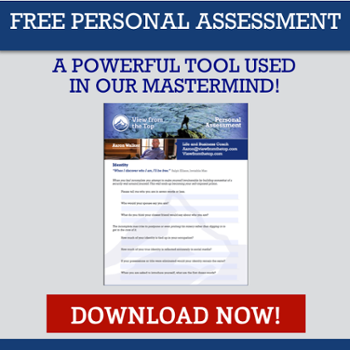.png?width=3200&name=Do%20you%20consider%20how%20much%20of%20your%20behavior%20affects%20the%20relationships%20with%20those%20around%20you%20(1).png)
This summer, a particular feature at a neighborhood water park caught my eye. A huge bucket balanced high above the splash area while a stream of water poured into it for several minutes. I watched the bucket totter as its volume filled until it finally began to slowly tip in one direction. All at once, it dumped its contents out and over the squealing of expectant children below it.
Just like it takes time to fill a tipping bucket, it takes time to establish a good reputation. And just like the sudden water dump, reputations can be squashed in a moment.
Fortunately, we have some control over our reputation buckets!
To find a community of professionals to help you establish priorities of integrity in how you deal with people around you, visit our website or apply to join one of our mastermind groups online.
Growing in Consistency
Mindshifts about important issues are certainly important as you mature and gain more knowledge of the world. But if you want to demonstrate a solid belief, you have to show it through behavior shifts. There is truth in the saying, “Put your money where your mouth is.” Actions create reality. You become what you behold.
Do you consider how much of your behavior affects the relationships with those around you?
James 2:15-16 tells the reader to consider this: “Suppose you see a brother or sister who has no food or clothing, and you say, ‘Good-bye and have a good day; stay warm and eat well’—but then you don’t give that person any food or clothing. What good does that do?”
This verse helps us remember that sometimes our resources and abilities exist to help the needs of others. Those needs might include something physical, but they often include something as “simple” as consistently building trust within a relationship.
Stephen M. R. Covey writes about the importance of establishing relationship trust in The Speed of Trust. He explains how behavior shapes who you become and creates the dynamics for your interactions with others. For example, if you feel caring, but your actions don’t demonstrate that feeling, are you really caring? Instead of thinking about how much you care, think about what you can do to physically care for someone. Put some feet to your feelings!
3 Steps to Consistent Living
Your honesty and integrity affect so much of how others view and trust you. Lying destroys trust. Not doing what you say ruins the confidence others have in you. Every effort should go into keeping your word and speaking the truth. Let your “yes” be yes, and your “no” be no.
However, as you consider this, don’t forget that truth without grace often looks and sounds like meanness. Stephen M. R. Covey compared this to a bull in a china shop.
Maya Angelo wisely observed, “I've learned that people will forget what you said, people will forget what you did, but people will never forget how you made them feel.” This idea will serve you well as you seek to establish trust through an honest reputation.
2. Honor and Respect Others
Human beings have intrinsic worth and dignity. Give honor to people close to you. Show care to others who seem to have nothing to offer you. Respect even those who may not have your best interests in mind.
Think about what you need to say and how you say it. Consider ways of communicating appropriately to the moment or the person. For instance, sarcasm and joking may have their place, but it takes wisdom to know when and how to use them. At times, speaking is unnecessary, but listening is the more important action.
Even small actions communicate respect or disrespect. Kind words, like “please” and “thank you,” demonstrate respect, as opposed to entitlement. Consistent encouragement and voiced appreciation to those in subordinate positions will go a long way in building them up and making them feel like their contributions and abilities are valued within the organization. Even something as simple as warmly acknowledging someone’s presence or welcoming them will often build trust.
3. Apologize and Make Amends
Don’t let your ego get in the way of making things right when you’ve done something wrong. Regularly own your mistakes and work to rebuild the damage. This includes more than simply saying, “I’m sorry for what I’ve done.” It means that you actively work to repair where you’ve broken trust.
Your consistent efforts to repair the damage will often strengthen bonds. Your pursuit will build trust because the other person knows that you care enough to set your own interests and pride aside to invest in mending the relationship.
As an added point to this—forgive when others wrong you. As Covey says, “Try to make it easier for others to right wrongs. Not only will this help them but it will also help you.”
Ask someone you trust about your reputation in these areas. How are you achieving trust through consistent behavior and better relationships?
Other like-minded professionals can encourage and challenge you to produce a lifestyle of consistency. Reach out to us at our website and apply to join one of our mastermind groups online.





